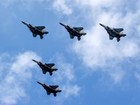A judicial investigation into a sophisticated impersonation plot has sent shockwaves through Lebanon’s political establishment this week, as authorities peel back the layers of the “Abou Omar” scandal -- a years-long fraud that allegedly manipulated high-level government appointments and parliamentary votes.
The scandal peaked following the arrest of Mustafa al-Hassian by Lebanese Army intelligence agents. Al-Hassian, a car mechanic from the Akkar region, was apprehended while attempting to enter Lebanon from Syria.
 Full Story
Full Story
Prime Minister Nawaf Salam has stressed that Hezbollah’s weapons should be “under the command of all Lebanese and under the decision of the Lebanese government.”
 Full Story
Full Story
Deputy Prime Minister Tarek Mitri on Friday described as “alarming” the reports about figures from Syria’s former regime using Lebanon as a launchpad for activities hostile to Syria’s new rulers.
 Full Story
Full Story
A report in Lebanese news portal al-Anbaa said Friday that the Israeli military is heavily deploying elite units on the border with Lebanon, in preparation for a possible operation against Hezbollah.
The daily said Israeli Prime Minister Benjamin Netanyahu is expected to hold a security and government meeting Sunday to make "exceptional" decisions, as he reportedly returns from the U.S. with a green light to act against Hezbollah if needed.
 Full Story
Full Story
Israel conducted Friday a series of strikes on south Lebanon and West Bekaa, including on al-Rihan mountains, the Tabna area near al-Baysariyyeh and Ansar's outskirts.
The Israeli army said it targeted a training center used by elite al-Radwan force and arms depots in south Lebanon.
 Full Story
Full Story
The French president’s special envoy to Lebanon, Jean-Yves Le Drian, will return to Beirut on January 7, An-Nahar newspaper reported on Friday.
 Full Story
Full Story
The Israeli Army is preparing options for action against Hezbollah, Israeli media reports said.
Israeli Maariv newspaper reported Friday that the options do not include an all-out war that would disrupt the ceasefire agreement, but a "limited offensive" or a series of high-intensity operations aimed at dismantling Hezbollah's long-range missile capabilities, which Israel claims are being rebuilt.
 Full Story
Full Story
The Israeli army has raised its readiness level in anticipation of a potential attack on Hezbollah, according to Israeli media reports.
 Full Story
Full Story
President Joseph Aoun on Wednesday hoped the Lebanese will enter the new year with a more stable and hopeful atmosphere.
 Full Story
Full Story
The days leading up to the Trump-Netanyahu summit witnessed intensive contacts between several Arab and European countries on one side and Washington on the other, resulting in an agreement on broad outlines, which received the support of some members of the White House team, Lebanese-American sources said.
“These outlines were discussed with the Israeli side, which did not express enthusiasm for them, while the final decision was left to the meeting” between Trump and Netanyahu, the sources told ad-Diyar newspaper.
 Full Story
Full Story



